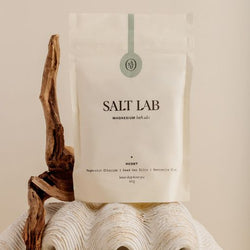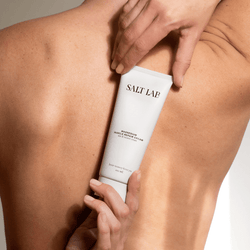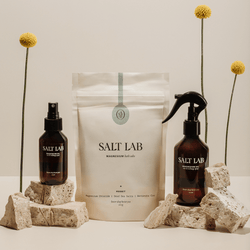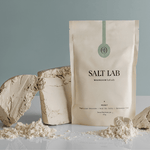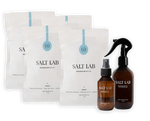Magnesium deficiency can intensify sugar cravings and impact; neurotransmitter regulation, energy production, and stress management. By incorporating magnesium-rich foods like almonds, dark chocolate, and spinach into your diet or using products like Salt Lab Magnesium, you can help alleviate cravings and support overall well-being.
If you experience sensitivities to sugar, it may be from a magnesium deficiency…
Magnesium is involved in the regulation of sugar in our bodies, when this is disrupted blood sugar levels become out of balance and increase the craving for sweet foods. The deficiency in magnesium leads to things like insulin resistance, a state in which hormones, like insulin, can’t properly regulate blood sugar levels. The body is trying to compensate for this unbalance, making you crave sugar more. The miscommunication in the body can signal that there is too little sugar in the body, making our brains action us to have something sweet when in reality we don’t need the sugar. Having enough magnesium helps insulin do its job better, like helping sugar get into cells where it's needed for energy. Magnesium also helps fight inflammation and stress, which play key roles in insulin resistance.
Did you know that people with diabetes often don't have enough magnesium in their bodies?

How is neurotransmitter regulation involved?
Magnesium, neurotransmitter regulation, and sugar cravings are all intricately connected within the body's biochemical reactions.
Magnesium is crucial for regulating brain chemicals, important for the production of serotonin, mood regulating hormones, and the function of NMDA receptors. NMDA receptors are believed to be the basis of memory formation, preventing neuronal damage. Additionally, Magnesium enhances the calming effects of GABA in the brain, calming the stress response system. Another benefit of magnesium for stress management is that it reduces the release of stress hormones like cortisol, which in turn increases the feeling of resilience and relaxation. By maintaining healthy magnesium levels it fosters optimal neurotransmitter function, stable blood sugar levels, and reduction in sugar cravings by addressing underlying biochemical imbalances.
You can ensure adequate magnesium intake through a number of ways. From magnesium rich foods through diet or the use of topical magnesium oils, enhancing emotional well-being, cognitive function, and overall brain health.
Sugar is a quick fix for some energy, what if you could get energy in other, more beneficial ways?
Magnesium is important for giving us energy by helping our bodies turning molecules in food into fuel called ATP. It also helps control our mood and appetite by keeping our brain chemicals balanced. When we don't have enough magnesium, we might feel tired or have low energy. This can make us want to eat sugary snacks to get a quick boost. However, this is short lasting and can cause crashes. Therefore, getting energy in more sustainable ways through magnesium in our food or supplements, it can help keep our energy up, our blood sugar stable, and even help sugar imbalance and cravings.

Craving a sweet treat after a stressful day is a shared experience.
Magnesium helps our bodies handle stress by regulating a key stress hormone, cortisol. When we're stressed, our cortisol levels go up, and we might start craving sugary foods for comfort. But if we have enough magnesium, it can help calm down this stress response and lessen those sugar cravings. Going through high levels of stress can use up more magnesium, therefore requiring a greater intake of magnesium. Making sure we have enough magnesium from our food or supplements can help us feel calmer, keep our blood sugar steady, and maybe even stop us from craving sugar when we're stressed.
So how do you make sure you’re getting enough magnesium to inhibit those sugar cravings?
According to the National Institutes of Health, an adult’s recommended daily intake of magnesium should be around 320 mg to 420 mg, depending on age and gender. Here some of our favourite magnesium rich foods:
- Almonds - In a serving of 100g there is 268 mg of magnesium.
- Dark Chocolate - In a serving of 100g there is 252.2 mg of magnesium.
- Chickpeas - In a serving of 100g there is 115 mg of magnesium.
- Cashews - In a serving of 100g there is 83 mg of magnesium.
- Spinach - In a serving of 100g there is 79 mg of magnesium.
Lastly, Salt Lab Magnesium - For every 1 ml of Salt Lab there is 400mg of magnesium chloride. This is a great way to meet your daily magnesium intake.
Magnesium is intricately involved in regulating blood sugar levels, neurotransmitter function, and energy metabolism, making it a vital nutrient for managing sugar cravings and promoting holistic health. Whether through dietary changes or the use of topical magnesium oils, addressing magnesium deficiency may offer relief for those experiencing sensitivities to sugar and help foster a healthier relationship with food and well-being.

